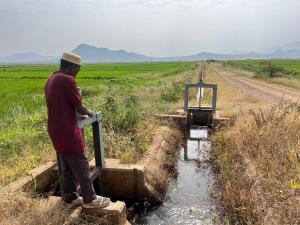Test project Pesticides and Protection Tanzania
testing out building a project
pece_annotation_1473631003
Sara.TillThe report quite clearly details the need to change our approaches to healthcare and epidemic emergencies. Currently, we seem to address these events in a singular method, and are unwilling to alter this approach. This is partially due to the narrow scope of patient care; for the most part, administering care to patients follows a standard guideline that does not seek to reach beyond that singular case. It is beyond the scope of a practitioner to attempt to mitigate socioeconomic discrepancies within their clinics alone. However, as Farmer and his colleagues argue, broadening this standard is necessary to combat illness. Biosocial factors, not just medicinal factors, need to be tackled in order to fully combat disease.
pece_annotation_1474230429
Sara.TillThe article seems to be primarily composed of thoughts from the author supported by evidence from historical, well-known occurrences. Moreover, both authors seem to have personal research in the fields identified here, making many of their arguments based on field experiences. There are cited reports and publications, but there does not appear to be an associated "Works Cited" page provided.
pece_annotation_1474766662
Sara.TillThis article particularly focuses on analysis in the aftermath of emergencies. Specifically, in the investigative processes of structural disasters. It highlights the awkward melding of various agencies in the face of public demand for answers. More than anything, it presents this instability in the investigative processes surrounding many emergencies; understanding the logistics of a building's collapse or how a fire rapidly spread only furthers comprehension of the disaster as a whole. Moreover, findings from this analysis could provide strategies for avoiding future emergencies of a similar nature. The article opens investigations for scrutiny, asking why such an integral part of the post-disaster process often gets swept aside.
pece_annotation_1475463366
Sara.TillThe chapter appears to be a compilation of accounts of immigrant medical treatments and overviews of the historical context behind several key situations. There is no bibliography, making it difficult to discern where these accounts came from. I can only assume most of this historical context came from Fissan's peers or other peer-reviewed works-- potentially another anthropological book.
pece_annotation_1477251702
Sara.TillThe report includes information gathered by both authors during the course of their own research, including citing several of their own publications within the report. Moreover, as a review article, the report includes work from other prominent epidemiologists, psychologists, and organizers of disaster relief; additionally, there appear to be several reports from various emergency response agencies providing data for prevalence of various mental disorders
pece_annotation_1478465699
Sara.TillIt addresses the public as a whole. Throughout the film, those involved in fighting for information/responsibility over Camp Lejeune emphasize the power of the public to write or speak about this issue. Moreover, it strongly demonstrates how often public welfare is shunned by those in power-- ironically, the least effected group.



the rice irrigation scheme, Pare Valley, Tanzania